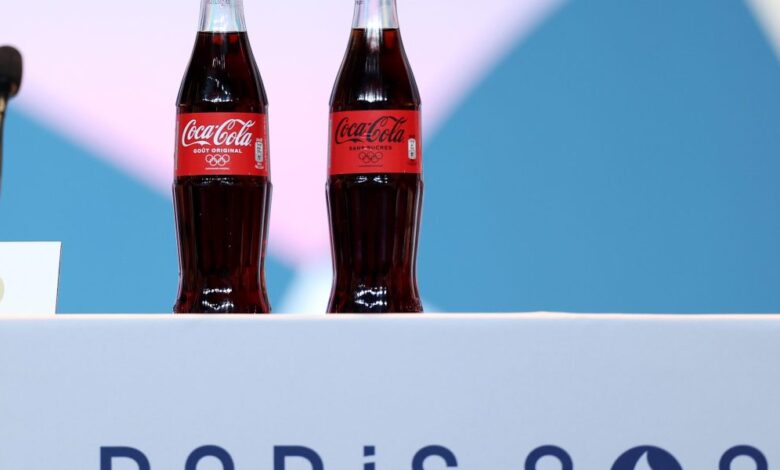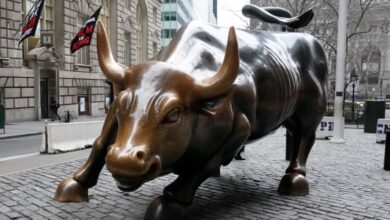Olympics under pressure to drop Coca-Cola sponsorship after nearly 100 years over health and environmental concerns


Two health experts on Tuesday called on Olympic organizers to cut ties with major sponsor Coca-Cola, arguing that the current major sponsorship deal allows the US company to “whitewash” sugary drinks as unhealthy.
Meanwhile, the Paris Olympics organizing committee said on Tuesday it would meet its target of halving the amount of single-use plastic used compared with the 2012 London Games, despite the widespread use of Coca-Cola plastic bottles at venues.
Events at the Paris Olympics featured advertisements for the popular soft drink Coca-Cola, a sponsor of the Games since 1928.
But according to Trish Cotter and Sandra Mullin of global health group Vital Strategies, these sugary drinks “have little or no nutritional value” and promoting such unhealthy products has no place in sport.
Sugary drinks are a “major contributor” to many serious health problems affecting people around the world, including obesity, diabetes, high blood pressure and heart disease, the pair wrote in a commentary in the journal BMJ Global Health.
They added that Coca-Cola products also contribute to global plastic pollution, greenhouse gas emissions and use huge amounts of water.
“By continuing to partner with Coca-Cola, the Olympic movement risks becoming complicit in exacerbating the global epidemic of poor nutrition, environmental degradation and climate change,” the authors write.
“It is time for the International Olympic Committee (IOC) to cut ties with Coca-Cola for the good of athletes, spectators and the planet.”
Coca-Cola did not respond to a request for comment.
Olympic staff were also seen pouring plastic bottles into reusable cups — an act that some said contradicted the Games’ pledge to be the greenest in history.
In May, the Coca-Cola Company said nearly 10 million of its 18 million soft drinks — “more than half” of all those served to audiences — would be “free of single-use plastic.”
But the Atlanta-based giant said it had to use plastic due to “technical and logistical constraints”, despite Paris banning spectators from bringing single-use containers to Olympic venues.
At the swimming event venue, for example, glass bottles were poured into red and white cups, as an AFP journalist noted.
Georgina Grenon, head of sustainability for the Paris Games, said that while 700 drinking fountains had been deployed throughout the competition, plastic bottles were still being used where there were no glass alternatives.
In a press release Friday, Coca-Cola said it needed to adapt to each location and find “the best conditions for food safety and quality,” due to technical and logistical constraints, including water supply, electricity and storage space.
But according to organizers, this year’s Paris Olympics should still cut plastic use compared to the 2012 London Olympics.
“Based on our estimates of what will be served… we believe we will achieve our goal of reducing single-use plastic by 50 percent,” Grenon said.
She added that bottles poured into cups would not count towards this goal.
Environmental charity France Nature Environment (FNE) criticised the company for “unjustifiable plastic pollution”, adding on Friday that the US company deserved a “gold medal for greenwashing” during the Olympics.
In 2020, Coca-Cola signed a $3 billion overall deal to renew its sponsorship of the Olympics.
This partnership will last until at least 2032.
According to the latest available data, in 2022, Coca-Cola, one of the world’s leading plastic manufacturers, produced 134 billion plastic bottles.
The drinks giant has set a target that by 2030 all of its bottles will be made from fully recycled plastic.
Of the bins currently in use at the Paris Olympics, Coca-Cola says about 6.2 million will be made from this type of plastic, also known as PET.
Vital Strategies’ Cotter and Mullin note that last year Coca-Cola sponsored more sports than any other brand, including sportswear companies like Nike.
“This strategy would provide a gold medal opportunity to ‘whitewash’ an unhealthy product,” they write.
The World Health Organization has called on countries to tax sugary drinks.
A petition launched ahead of the Games called “Remove fizzy drinks from sport” has gathered more than 109,000 signatures and is backed by a number of public health organisations, including the World Obesity Federation.




